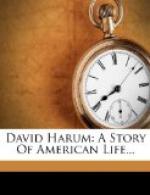“‘Be I goin’ with you?” I says.
“‘Why not?’ he says, ‘’nless you’d ruther go alone,’ an’ he put his finger an’ thumb into his vest pocket. Wa’al, ma’am, I looked at him a minute, with his shiny hat an’ boots, an’ fine clo’es, an’ gold pin, an’ thought of my ragged ole shirt, an’ cotton pants, an’ ole chip hat with the brim most gone, an’ my tin pail an’ all. ‘I ain’t fit to,’ I says, ready to cry—an’—wa’al, he jest laughed, an’ says, ‘Nonsense,’ he says, ‘come along. A man needn’t be ashamed of his workin’ clo’es,’ he says, an’ I’m dum’d if he didn’t take holt of my hand, an’ in we went that way together.”
“How like him that was!” said the widow softly.
“Yes, ma’am, yes, ma’am, I reckon it was,” said David, nodding.
“Wa’al,” he went on after a little pause, “I was ready to sink into the ground with shyniss at fust, but that wore off some after a little, an’ we two seen the hull show, I tell ye. We walked ‘round the cages, an’ we fed the el’phant—that is, he bought the stuff an’ I fed him. I ’member—he, he, he!—’t he says, ‘mind you git the right end,’ he says, an’ then we got a couple o’ seats, an’ the doin’s begun.”
CHAPTER XX.
The widow was looking at David with shining eyes and devouring his words. All the years of trouble and sorrow and privation were wiped out, and she was back in the days of her girlhood. Ah, yes! how well she remembered him as he looked that very day—so handsome, so splendidly dressed, so debonair; and how proud she had been to sit by his side that night, observed and envied of all the village girls.
“I ain’t goin’ to go over the hull show,” proceeded David, “well ’s I remember it. The’ didn’t nothin’ git away from me that afternoon, an’ once I come near to stickin’ a piece o’ gingerbread into my ear ‘stid o’ my mouth. I had my ten-cent piece that Billy P. give me, but he wouldn’t let me buy nothin’; an’ when the gingerbread man come along he says, ‘Air ye hungry, Dave? (I’d told him my name), air ye hungry?’ Wa’al, I was a growin’ boy, an’ I was hungry putty much all the time. He bought two big squares an’ gin me one, an’ when I’d swallered it, he says, ‘Guess you better tackle this one too,’ he says, ‘I’ve dined.’ I didn’t exac’ly know what ‘dined’ meant, but—he, he, he, he!—I tackled it,” and David smacked his lips in memory.
“Wa’al,” he went on, “we done the hull programmy—gingerbread, lemonade—pink lemonade, an’ he took some o’ that—pop corn, peanuts, pep’mint candy, cin’mun candy—scat my ——! an’ he payin’ fer ev’rythin’—I thought he was jest made o’ money! An’ I remember how we talked about all the doin’s; the ridin’, an’ jumpin’, an’ summersettin’, an’ all—fer he’d got all the shyniss out of me for the time—an’ once I looked up at him, an’ he looked down at me with that curious look in his eyes an’ put his hand on my shoulder. Wa’al, now, I tell ye, I had a queer, crinkly feelin’ go up an’ down my back, an’ I like to up an’ cried.”




